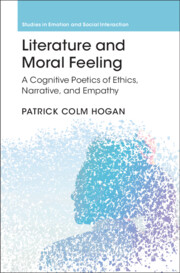Book contents
- Literature and Moral Feeling
- Studies in Emotion and Social Interaction
- Literature and Moral Feeling
- Copyright page
- Dedication
- Contents
- Figures
- Acknowledgments
- Introduction:
- Chapter 1 Defining Ethics
- Chapter 2 The Implied Ethics of Julius Caesar
- Chapter 3 Narrative Universals, Emotion, and Ethics
- Chapter 4 Ethics and Narrative Genre:
- Chapter 5 Emotion and Empathy
- Chapter 6 The Dynamics of Empathic Response:
- Chapter 7 Evaluating Empathy
- Chapter 8 The Critical Empathy of Angels in America
- Afterword:
- References
- Index
- Studies in Emotion and Social Interaction
Chapter 8 - The Critical Empathy of Angels in America
Published online by Cambridge University Press: 21 April 2022
- Literature and Moral Feeling
- Studies in Emotion and Social Interaction
- Literature and Moral Feeling
- Copyright page
- Dedication
- Contents
- Figures
- Acknowledgments
- Introduction:
- Chapter 1 Defining Ethics
- Chapter 2 The Implied Ethics of Julius Caesar
- Chapter 3 Narrative Universals, Emotion, and Ethics
- Chapter 4 Ethics and Narrative Genre:
- Chapter 5 Emotion and Empathy
- Chapter 6 The Dynamics of Empathic Response:
- Chapter 7 Evaluating Empathy
- Chapter 8 The Critical Empathy of Angels in America
- Afterword:
- References
- Index
- Studies in Emotion and Social Interaction
Summary
The seventh chapter follows the pattern of extending and specifying theoretical points through the close interpretation of a literary work, in this case Tony Kushner’s widely admired, award-winning treatment of the AIDS crisis, Angels in America. This chapter also develops a concept of “critical empathy,” designed to respond to some potential problems raised by critics of empathy. Critical empathy involves effortful compensation for empathic biases (e.g., the saliency of the target or his or her in-group status). It also involves attention to ameliorating the condition of the targets of empathy, rather than brooding on shared emotional pain. In relation to these points, the chapter articulates a distinction between normative outcomes (the objective conditions that we would judge to be consistent with ethical imperatives, whatever their motivations) and ethical choices (the decisions that derive from ethical motivations, whatever their results). Additionally, the chapter considers the dynamics and ethical implications of guilt, shame, and attachment bonding.
- Type
- Chapter
- Information
- Literature and Moral FeelingA Cognitive Poetics of Ethics, Narrative, and Empathy, pp. 242 - 259Publisher: Cambridge University PressPrint publication year: 2022

